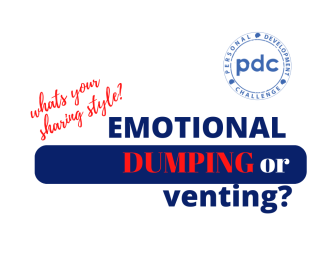Emotional dumping and healthy venting are two different ways of expressing emotions and seeking support. While healthy venting can be constructive and beneficial for both the person venting and their listener, emotional dumping tends to be overwhelming and one-sided. Let me share a story to illustrate the differences between the two.
Once upon a time, there were two friends, Alice and Bob, who had been close for years. They often turned to each other for support during challenging times. One day, Alice had a particularly difficult day at work. She felt stressed, frustrated, and overwhelmed. Alice decided to reach out to Bob to share her feelings.
Emotional Dumping:
Alice: “Bob, I can’t believe what happened at work today! My boss is so unfair. He criticized my every move and made me feel incompetent. I just can’t handle this anymore. I’m so tired and stressed. Everything is falling apart, and I don’t know what to do.”
Bob: “Oh, I’m sorry to hear that. It sounds really tough.”
In this case, Alice engages in emotional dumping by offloading her negative emotions without considering Bob’s feelings or capacity to help. Alice’s monologue overwhelms Bob, leaving him feeling helpless and burdened.
Healthy Venting:
Alice: “Hey Bob, can I talk to you about something?” Bob: “Hey Alice, sure, but can we talk later over a coffee, I am dealing with something else right now?” Alice: “Sure, thanks, I will be looking forward, and all the best in what you are handling my friend” Later over a coffee, when Bob was prepared to hear Alice out. Alice: “I had a rough day at work, and I feel frustrated. My boss criticized my work today, and it really affected my confidence. I’m feeling stressed and unsure about how to handle this situation.”
Bob: “Of course, Alice. I’m here for you. That sounds really challenging. Have you considered talking to HR or discussing your concerns with your boss? Maybe we can brainstorm some strategies together.”
In this scenario, Alice engages in healthy venting by expressing her emotions and concerns, but also acknowledging Bob’s presence and seeking advice. Bob actively listens, empathizes with Alice, and offers support and suggestions to help her navigate the situation.
In the first example, Alice engages in emotional dumping, overwhelming Bob with a barrage of negative emotions without considering his well-being. This can strain their friendship and create an unbalanced dynamic.
On the other hand, in the second example, Alice practices healthy venting by acknowledging Bob’s presence, sharing her emotions in a more measured way, and seeking his input. Bob actively listens, shows empathy, and offers constructive suggestions. This kind of interaction fosters a supportive friendship and allows both individuals to benefit from the conversation.

- Call us: +254 123 456
- Email: info[@]pdc.co.ke
Have any questions
Take the Challenge

